#Discusses bilateral relations
Explore tagged Tumblr posts
Text
youtube
#youtube#militarytraining#usmilitary#news#South Africa#global politics#international cooperation#diplomatic talks#global leaders#U.S. Secretary of State#Secretary Blinken#diplomacy in action#bilateral talks#international relations#foreign policy#international diplomacy#South Africa news#diplomatic relations#U.S. diplomacy#government meeting#foreign relations#political discussions
0 notes
Text
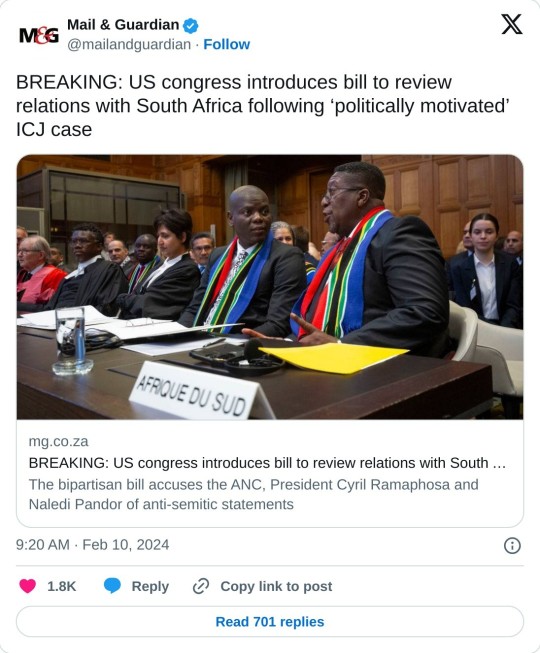
A bill has been submitted to the United States congress calling for a full review of the country’s bilateral relationship with South Africa following the International Court of Justice ruling that found it plausible that Israel has committed acts of genocide against Gaza. The bipartisan bill which was introduced by US Republican congressman John James and Democratic Party congressman Jared Moskowitz this week could threaten South Africa’s prospects to benefit from the African Growth and Opportunity Act (AGOA). The bill will still need to be discussed and passed by congress. It states that not later than 30 days after the date of enactment of this Act, US President Joe Biden in consultation with the Secretary of State and the Secretary of Defense, shall certify to the appropriate congressional committees and release publicly an unclassified determination explicitly stating whether South Africa has engaged in activities that undermine United States national security or foreign policy interests.
#yemen#jerusalem#tel aviv#current events#palestine#free palestine#gaza#free gaza#news on gaza#palestine news#news update#war news#war on gaza#south africa#icj ruling#genocide#gaza genocide
4K notes
·
View notes
Text

🇮🇶⚔️ 🇺🇲 🚨
GOVERNMENT OF IRAQ MOVES TO END U.S. OCCUPATION PRESENCE
The Iraqi government will move to end the presence of the U.S.-led coalition occupation in Iraq, according to the Iraqi Prime Minister, Mohammed Shia' al-Sudani.
Al-Sudani made the comments at a joint press conference with the visiting Spanish Prime Minister, Pedro Sanchez on Thursday, Dec. 28th.
Al-Sudani said the topic was broached during his meeting with Sanchez, during which they discussed the details of the presence of the international coalition in Iraq.
"We appreciate the role of the coalition in supporting Iraq's efforts to confront the Islamic State militants," Al-Sudani said.
"The Iraqi government is in the process of rearranging the relationship with the international coalition in light of the presence of capable Iraqi forces," said the Iraqi prime minister, stressing that "the Iraqi government is moving toward ending the presence of the international coalition forces, which include security advisers who support the security forces in the areas of training, advice, and intelligence cooperation."
The two leaders discussed in depth the difficult situation in the Middle East, including the ongoing Israeli genocide of Palestinians in Gaza. Al-Sudani said he appreciated Spain's role and its "courageous stance in condemning these attacks."
Sanchez, for his own part, expressed his country's desire to develop relations with Iraq, in particular the fields of transportation, education, climate change, and defense.
The Spanish Prime Minister also met with the Iraqi President, Abdul Latif Rashid, to discuss ways to enhance bilateral cooperation, and the need to end the genocide in Gaza.
Spain is part of the U.S.-led international coalition tasked with training and advising Iraq's Security Forces in its fight against the radical islamic group, ISIS.
#source
@WorkerSolidarityNews
#iraq#iraq news#iraqi news#iraqi politics#iraq politics#middle east news#middle east#us occupation#occupation of iraq#us military#invasion of iraq#war#wars#war news#politics#news#geopolitics#world news#global news#international news#breaking news#current events#conflict#international coalition in iraq#invasion#occupation#us politics#us wars#us foreign policy#us news
153 notes
·
View notes
Photo

European Union, EEA and candidate states in July 2024
by DrNeutrino
European Union (EU) contains 27 member states. There are 9 candidate states: Turkey (1999), North Macedonia (2005), Montenegro (2010), Serbia (2012), Albania (2014), Ukraine (2022), Moldova (2022), Bosnia-Herzegovina (2022) and Georgia (2023).
About states aspiring to join EU:
Kosovo is an applicant and recognised as potential candidate.
While Armenia is not officially neither an applicant nor a potential candidate, I have included it in the category, as the Armenian PM has stated that the country will apply to by fall 2024 and in 12 March vote at European Union it was confirmed that Armenia meets the requirements for applying.
Turkey’s accession negotiations were frozen in 2019 due to democratic backsliding. In 2023 EU rejected Turkey’s proposal to unfreeze the accession negotiations in exchange of letting Sweden accede to NATO.
The application of Ukraine and Moldova is in screening phase which is prerequisite to opening 35 acquis chapters.
North Macedonian application will proceed to opening acquis chapters once the country approves a constitutional amendment related to Bulgarian minority. Albanian application is tied to North Macedonia.
Georgia passed a foreign agent law on 14 May, which is viewed anti-democratic and contradicts the conditions for EU candidacy. Due to this, the accession process was suspended on 9 July and the money for accession assistance was frozen.
About states which are not aspiring to join:
Norway rejected membership in 1972 and 1994 referenda.
Iceland applied in 2009 and was on fast track for membership, but the application process was frozen after 2013 election and withdrawn in 2015. There has been discussion of referendum to resume application.
Switzerland applied to EU and EEA in 1992 but joining was rejected in a referendum on the same year. Instead Switzerland has bilateral treaties with EU.
United Kingdom joined EU in 1973 but membership was rejected in 2016 referendum, and UK withdrew in 2020.
EU has plans to reform before the next enlargement, which has a target year 2030.
64 notes
·
View notes
Text
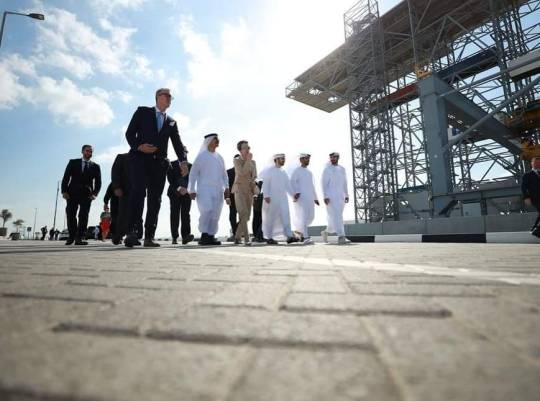

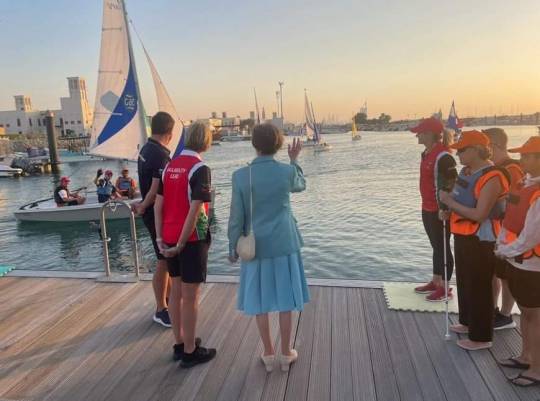
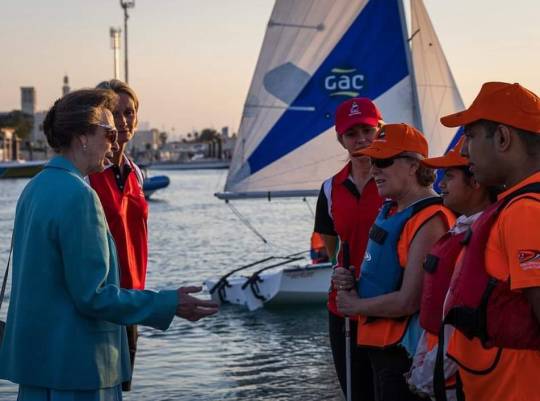
Her Royal Highness The Princess Royal visited the UAE on 1 March 2024. The Princess Royal received a warm welcome by UAE Officials and British Expats based in Dubai. HRH was hosted by The Mission to Seafarers (MtS), a charity which she has been President of since 1984. HRH visited DP World’s Jebel Ali Port, which was inaugurated 45 years ago by the late Queen Elizabeth II, in 1979. A female panel discussion also marked HRH’s visit, where she delivered a speech at the Women in Shipping and Trading Conference, jointly hosted by MtS and DP World. This visit builds on the strong bilateral relations between the UK and the UAE and reflects the solid continuous relationship between the Emirati and British Royal family. This is the fourth visit of HRH The Princess Royal to the UAE, who was here on multiple occasions in 1984, 1987, and 1991.
© UK in UAE
54 notes
·
View notes
Text
Reference Archived on our website
Introduction: There is a growing interest in the effect of Long-COVID (LC) on cognition, and neuroimaging allows us to gain insight into the structural and functional changes underlying cognitive impairment in LC. We used multimodal neuroimaging data in combination with neuropsychological evaluations to study cognitive complaints in a cohort of LC patients with mild to moderate severity symptoms.
Methods: We conducted a 3T brain magnetic resonance imaging (MRI) study with diffusion tensor imaging (DTI) and functional MRI (fMRI) sequences on 53 LC patients 1.8 years after acute COVID-19 onset. We administered neuropsychological tests to evaluate cognitive domains and examined correlations with Tract-Based Spatial Statistics (TBSS) and resting state.
Results: We included 53 participants with LC (mean age, 48.23 years; 88.7% females). According to the Frascati criteria, more than half of the participants had deficits in the executive (59%) and attentional (55%) domains, while 40% had impairments in the memory domain. Only one participant (1.89%) showed problems in the visuospatial and visuoconstructive domain. We observed that increased radial diffusivity in different white matter tracts was negatively correlated with the memory domain. Our results showed that higher resting state activity in the fronto-parietal network was associated with lower memory performance. Moreover, we detected increased functional connectivity among the bilateral hippocampus, the right hippocampus and the left amygdala, and the right hippocampus and the left middle temporal gyrus. These connectivity patterns were inversely related to memory and did not survive false discovery rate (FDR) correction.
Discussion: People with LC exhibit cognitive impairments linked to long-lasting changes in brain structure and function, which justify the cognitive alterations detected.
#mask up#covid#pandemic#covid 19#wear a mask#public health#coronavirus#sars cov 2#still coviding#wear a respirator#long covid#covid conscious#covid is airborne
14 notes
·
View notes
Text
Brazilians and Saudis discuss women’s inclusion
The Arab-Brazilian Chamber held a meeting between female leaders from Brazil and members of a Saudi delegation in São Paulo for the B20 Summit. The group shared experiences in business.

The Arab-Brazilian Chamber of Commerce (ABCC) hosted on Monday (21) an exchange of experiences between Brazilians and Saudis on the participation of women in business and in bilateral and multilateral relations between the countries. The institution organized a roundtable with female representatives from Brazilian business associations and executives from SABIC, a Saudi Arabia-based leading chemical company.
The Saudis are in Brazil to participate on Thursday (24) and Friday (25) in São Paulo in the B20 Summit, a group that brings together the private sector of the G20 member countries, of which Saudi Arabia and Brazil are part. SABIC is leading the Saudi delegation at the B20. During the meeting in the ABCC, SABIC representatives were introduced to the work of the institution’s women’s committee WAHI – Women Who Inspire, which organized the roundtable “Women, Diversity, and Inclusion.”
WAHI chairwoman Alessandra Frisso explained that the committee was created to empower and unite Brazilian and Arab female entrepreneurs and mentioned that platforms such as B20, BRICS, and the UN COP30 climate summit—the latter to be held in Brazil in 2025—can play major roles in advancing women’s inclusion and promoting diversity.
Frisso said WAHI is committed to promoting dialogue between Brazil and Saudi Arabia and shared the committee’s projects aimed at the Arab country. Plans include facilitating the visit of a Brazilian female delegation to Saudi Arabia in 2025, as well as welcoming a group of Saudi women to Brazil, in addition to promoting exchanges of knowledge, experiences, and opportunities among them.
The Saudis also learned about the role of Brazilian women in the BRICS Women’s Business Alliance (WBA
Continue reading.
#brazil#politics#saudi politics#feminism#economy#brazilian politics#saudi arabia#international politics#image description in alt#mod nise da silveira
7 notes
·
View notes
Text
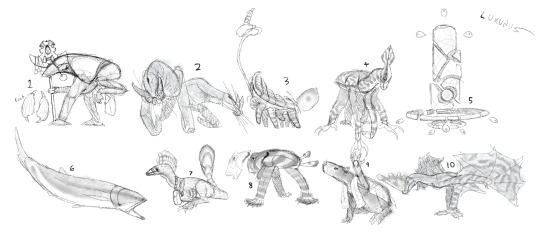
A bunch of ideas i had for spectember and general spec evo related ideas that never came to be but were redrawn as a second chance. All but two ideas were made during spectember of 2021. The top are meant to be alien life while the bottom are meat to be earth life.
In order by their number
An alien sophont originally conceived around 6th grade and were planned to be brought back for spectember 2021. These nomadic carnivores live in the twilight zone of a tidally locked planet. Their hind limbs were once meant to act as pseudo-tails because their ancestors never had one but now act as arms. Creating this reverse body plan compared to humans and their limbs. They also have a hag worm-like mouth that can eject like a sturgeon
2 blind, lithovorous aliens that evolved from cave dwelling ancestors. Their sulfur rich homeplanet experienced a mass extinction so devastating it made the Permian great dying look modest in comparison.
A hydraulic limbed alien from a blistering hot super-earth covered in storms. They shoot their copper drill-tipped proboscis into the air and keep it suspended with air sacs to feed off of electricity produced by lightning.
A secondarily bilateral sophont from a tropical planet with a climate that's frighteningly similar to South America. They would visit earth some 100,000 years ago for reasons discussed later.
A transcendent alien who's original organic forms are lost to time. Their modern bodies are made up of several metallic pieces capable of floating midair and defy all laws of physics. They are capable of creating new universes and seeding it with life. By all definitions they are no different from gods.
A massive filter feeding descendant of modern lantern fish. They can control their bio luminescence as a way to communicate with their relatives or mates
A sophont arboreal descendant of Dromaeosaurs in an alternate earth where the KPG mass extinction never happened. They were originally drawn back in april of 2021.
A distant terrestrial descendant of mudskippers. Not much can be said sadly
A sophont capybara uplifted to become apprentices of the aliens in #4. Their similar climate preference meant that the capybaras could live on their planet albeit with a few modifications. Their braincase is larger, Their pinky fingers were modified to become opposable. And their respiratory system was modified to breathe in their new alien atmosphere.
A far future descendant of komodo dragons on a seed world made just for them that now became true dragons. Their planet isn't in this universe but instead a pocket dimension created by the alien gods in #5
#my art#artist on tumblr#speculative biology#art#worldbuilding#xenobiology#alien species#speculative zoology
42 notes
·
View notes
Text
IGORA /Leningrad Region/, December 26. /TASS/. Presidents of Belarus and Russia Alexander Lukashenko and Vladimir Putin discussed regional security and bilateral relations during a one-on-one meeting on Wednesday, said Natalia Eismont, spokeswoman of the Belarusian leader.
"You and I understand that presidents can never sidestep security issues. The number one item on the agenda is security issues in general, regional security, the situation that is unfolding now, as it is changing literally by the hour, if not by the minute. So, of course, these are number one issues," she said.
According to the spokeswoman, they also talked about cooperation between the countries in a variety of areas, including economy.
"Of course, the Supreme State Council held a meeting fairly recently, but nevertheless the governments are working and doing it very well, vigorously. The presidents are always in touch, through formats including telephone conversations, and here, they always find an opportunity to discuss issues on the bilateral agenda," Eismont said.
She also said, citing the Belarusian leader, that the presidents spoke not only about government matters, but also personal ones.
3 notes
·
View notes
Text
5 notes
·
View notes
Text
It was a long time coming. Sure, U.S. President Joe Biden was among the Western leaders of the G7 when they convened at a German castle called Schloss Elmau in June 2022, and President Donald Trump growled his way through a gathering of the larger G20 in Hamburg in July 2017.
But not since November 2016, when President Barack Obama embarked on a farewell tour of Europe and had dinner with German Chancellor Angela Merkel, had a U.S. president made a bilateral visit to Germany.
For sure, the COVID-19 pandemic got in the way. American leaders don’t seem to travel as much as they used to. Yet, excuses aside, it was curious that Biden’s lightning visit to Berlin last week was both his first and last as the “leader of the free world” (a term that some Germans still cling to). Even that trip was fraught, having been postponed by a week as Biden attended to the aftermath of Hurricane Milton in Florida.
The trip was supposed to be somewhat longer, but the grandeur was retained—a military welcome by German President Frank-Walter Steinmeier, at his Schloss Bellevue residence, followed by the conferring of the country’s highest honor. Then came the work in earnest: political talks with Germany Chancellor Olaf Scholz, French President Emmanuel Macron and British Prime Minister Keir Starmer.
All of them were supposed to convene with Ukrainian President Volodymyr Zelensky at the U.S. Ramstein Air Base to discuss his “victory plan” to win the war against Russia, as part of a meeting of the Ukraine Defense Contact Group. When Biden postponed his visit, the meeting was rescheduled, too. But desperate for political progress and for more weapons deliveries ahead of a long winter of combat, Zelensky still went to Germany on a trip that also included visits to London, Paris, and Rome—and left seemingly empty-handed.
Macron and Starmer synchronized their trips with Biden’s, but for all the rhetoric of steely determination, developments on the Ukraine front are seemingly scant. Although he wasn’t mentioned by name, all eyes were on Trump with just under three weeks from the U.S. presidential election.
Ukraine is the issue around which future U.S.-European relations will hinge, irrespective of whether Trump or Kamala Harris prevail. As Norbert Röttgen, a member of the Bundestag, said in a TV interview, “If Russia wins, the West as we know it will cease to exist.” His party, the opposition center-right Christian Democratic Union, has adopted a policy of sending Ukraine long-range Taurus missiles if Russia continues to attack key infrastructure. That is a position the ever-cautious Scholz has refused to take.
The second curiosity of the Biden-Scholz relationship is that both leaders have given far and away the most amount of help to Ukraine, and yet both are accused (with some justification) of dragging their feet, of handing Zelensky just enough so as not to lose the war but not enough to drive Russian forces out of occupied land.
Despite Biden’s previous absence from Germany, he and Scholz have become close, as both were keen to demonstrate. Biden described Germany as “the closest and most important of allies” (words that wouldn’t have delighted Brits still wedded to their notion of the “special relationship”). He praised Scholz, a leader who “rose to meet the moment” and thanked him multiple times. On the ropes domestically, his authority draining away, Scholz smiled a wide smile.
Their relationship didn’t start that way. When the newly elected chancellor arrived at the White House in February 2022, he was told in public by Biden and in private by intelligence chiefs that Russian President Vladimir Putin was about to invade Ukraine. Scholz and his own security apparatus had taken a more credulous view of the Kremlin leader, only to be forced to row back incredibly quickly a few weeks later.
His fabled Zeitenwende speech, which signaled a new harder approach on Russia, also marked a turning point. Scholz and Biden have largely been in lockstep since, both in their courage and their hesitation in regards to both Ukraine and Israel. The most important area of divergence remains China, where Germany’s trade dependency continues to guide a political relationship that is far more benign.
As Biden said his goodbyes, attention now turns to Trump. Indeed, they have been for a long time, even before Biden was persuaded by his own party not to seek reelection and a Trump victory was as good as baked into Berlin’s thinking.
All precedent suggests that if Trump does win, Germany and Europe are in for a desperately rocky ride.
It’s worth briefly dwelling on the past. Over that fateful farewell dinner in Berlin eight years ago, Obama pleaded with Merkel to stay on as chancellor. She had already served three terms and was keen to hand over the mantle. According to aides, Obama pointed out that with Trump about to succeed him in the White House and with the United Kingdom in the throes of chaos after its Brexit vote, Europe needed stability and a wise hand on the tiller.
It had taken Merkel some time to warm to Obama and vice versa. She had found his easy charisma a little alienating. Matters were made worse when Merkel found out through research by Der Spiegel on the Snowden files that the U.S. National Security Agency (NSA) had been bugging her mobile phone for since 2002. The fact that she was just one of 122 world leaders in the surveillance database system known as Nymrod didn’t lessen the fury. Germany was supposed to be one of the United States’ staunchest allies. In an angry phone exchange with Obama, deliberately shared later with Der Spiegel, she said, “This is like the Stasi.” From that low point, relations improved rapidly, but tensions remained, not least of which was due to Germany’s reluctance to meet the agreed NATO target of at least 2% GDP spending on defense.
From the outset, Trump loathed Merkel. During his first election campaign, he routinely insulted her. “They picked person who is ruining Germany,” he said after Time chose Merkel as its Person of the Year in 2015. What particularly upset him was the magazine calling her “chancellor of the free world.”
In March 2017, Merkel flew to Washington, D.C., for her first meeting with Trump. She prepped assiduously, according to the New Yorker. She studied a 1990 Playboy interview that had become a set text on Trumpism—or the nearest thing anybody could find—for policymakers. She read his 1987 book, The Art of the Deal. She even watched episodes of his TV show, The Apprentice. The meeting started badly. She offered him a handshake in the Oval Office in front of the cameras. He didn’t take it.
Trump’s manner was not designed to endear. But that didn’t mean that all his criticisms were invalid. His misgivings about Russia and the Nord Stream gas pipeline were legitimate. His concerns about China and Germany’s trade dependency were equally legitimate. He wasn’t the only one to criticize defense spending—from George Bush to Obama and even now, this has been the standard view in Washington.
About 18 months into Trump’s presidency, Merkel concluded that it would be impossible to develop any kind of meaningful relationship with him. The best she could hope for was to manage the problem. Trump dispatched a longtime hawk and Fox News shock-jock commentator Richard Grenell to Berlin as U.S. ambassador. Grenell went immediately on a warpath, denouncing Germany on a regular basis and vowing to “empower conservatives” across Europe. Grenell is now being touted as possible national security advisor if Trump wins, an appointment that would be seen as a direct act of confrontation.
If Harris were to win, relations would remain on a more even level, but the difficulties would not be dispelled. The United States wants Europe to be more self-sufficient in its defense and tougher on China. Germany has a long way to go toward achieving those ends. Moreover, Washington is already looking to a future beyond not just Biden but also Scholz.
4 notes
·
View notes
Text
youtube
#youtube#militarytraining#news#State Department#diplomatic talks.#top officials#partnership#international relations#politics#United States#official visit#Secretary Blinken#Haitian PM#Haitian FM#diplomacy#Haiti#meeting#collaboration#current events#government#foreign affairs#discussion#bilateral relations#policy discussions#Department of State#press conference#Secretary of State#negotiation#Haitian officials#summit
0 notes
Text


Spanish State Visit to Netherlands - Day 2
Deputy Prime Minister Rob Jetten receives King Felipe at the Binnenhof and host a government lunch attended by King Willem-Alexander. Topics that will be discussed during this lunch include Spanish-Dutch bilateral relations and European cooperation on energy and climate policy. Deputy Prime Minister Jetten and King Felipe will both give a speech. April 18, 2024.
📷 Royal House of the Netherlands
#dutch royal family#king willem alexander#king felipe vi#spanish royal family#spanish state visit to netherlands
8 notes
·
View notes
Text
Delighted to Host the Distinguished Singapore Delegation at the Rising: Col Rajyavardhan Rathore


Singapore-India: A Growing Partnership
India and Singapore share a long-standing partnership characterized by mutual respect, economic collaboration, and cultural exchange. The Singapore delegation’s participation in the summit reflected their interest in Rajasthan’s transformative initiatives and investment opportunities.
Highlights of the Delegation’s Visit
1. Focus on Key Sectors
The delegation explored opportunities in critical sectors, including:
Information Technology
Urban Development and Smart Cities
Renewable Energy
Tourism and Hospitality
2. Knowledge Exchange Sessions
The visit included interactive sessions where delegates shared Singapore’s best practices in urban planning, technological innovation, and sustainable development.
3. Investment Opportunities in Rajasthan
The delegation showed keen interest in Rajasthan’s ambitious projects, such as the new IT city near Gurugram and initiatives under the Rising Rajasthan Global Investment Summit.
Colonel Rathore’s Vision for Global Partnerships

The Rising Rajasthan Advantage
Rajasthan is emerging as a preferred destination for international investors due to its:
Pro-business policies like the Rajasthan MSME Policy 2024.
Strategic location connecting major industrial hubs.
Abundance of resources and skilled labor.
Robust infrastructure and expanding digital ecosystem.
Singapore’s Contribution to the Vision
Singapore’s success as a global hub of innovation and sustainability serves as a model for Rajasthan. Their collaboration could enhance Rajasthan’s initiatives in:
Smart city projects with advanced infrastructure.
Technology parks to support startups and IT development.
Sustainable urbanization for better living standards.
Key Outcomes of the Visit
1. Enhanced Collaboration
The discussions paved the way for partnerships in areas like smart technology and renewable energy.
2. Memorandums of Understanding (MoUs)
Several agreements were signed to facilitate knowledge transfer and investments in Rajasthan’s key sectors.
3. Strengthened Bilateral Relations
The visit reinforced the relationship between Rajasthan and Singapore, setting a strong foundation for future collaborations.
Building Bridges for the Future
The visit of the Singapore delegation signifies Rajasthan’s growing stature on the global stage. Such international partnerships are critical for fostering innovation, creating jobs, and driving sustainable development.
A Step Toward a Bright Future
Hosting the distinguished Singapore delegation at the Rising Rajasthan Global Investment Summit 2024 was a milestone in strengthening Rajasthan’s global ties. With visionary leadership from Col Rajyavardhan Rathore and a commitment to collaboration, Rajasthan is poised for transformative growth. Together with partners like Singapore, the state is ready to unlock its full potential and lead the way in innovation, sustainability, and prosperity.
3 notes
·
View notes
Text
Biden, Xi to meet in Peru as US-China relations tested by Trump’s return
A meeting between incumbent US President Joe Biden and Chinese President Xi Jinping will be held on the sidelines of the Asia-Pacific Economic Co-operation (APEC) summit in Lima, Peru’s capital, on Saturday.
Officials told reporters that President Biden wants to discuss military-to-military interaction between the two countries.
Biden is likely to emphasise the importance of maintaining peace and security in the Taiwan Strait and express concern over China’s actions in the South China Sea.
The US president is also expected to express deep concern over the increased co-operation between Russia and North Korea.
The leaders are also expected to discuss bilateral cooperation in the fight against drugs. Fentanyl overdoses are a serious problem in the US. There have been several cases where fentanyl manufactured using materials originating in China has been smuggled into the US.
Biden and Xi Jinping last met on November 15, 2023 on the sidelines of the Asia-Pacific Economic Co-operation summit in San Francisco.
China, commenting for the first time on the recent US election, said it hoped for continued peaceful and mutually beneficial co-existence. Beijing declined to comment on Donald Trump’s threats to increase tariffs on Chinese goods.
Xi Jinping had a telephone conversation with Trump the other day. The Chinese leader hailed the Republican on his victory in the US presidential election.
Read more HERE

#world news#news#world politics#usa#usa politics#usa news#usa 2024#united states#united states of america#america#us politics#trump#donald trump#donald trump 2024#trump 2024#biden#joe biden#biden administration#president biden#china#china news#chinese politics#xi jinping
2 notes
·
View notes
Text








May 27, 2013
Meeting with President of Kyrgyzstan Almazbek Atambayev. The two leaders discussed the whole range of their bilateral relations. Discussions touched on military cooperation and the use of Kant Air Base [in Kyrgyzstan].
During the meeting, special attention was paid to the implementation of earlier agreements, particularly the construction of the Kambarata hydropower plant. They also took a walk through the Ala-Archa gorge.
The President of Russia is in Kyrgyzstan to attend the informal meeting of the Collective Security Treaty Organisation (CSTO) heads of state.
#vladdy daddy#vladimir putin#vladimir vladimirovich putin#putin#kyrgyzstan#Президент России Владимир Путин
3 notes
·
View notes